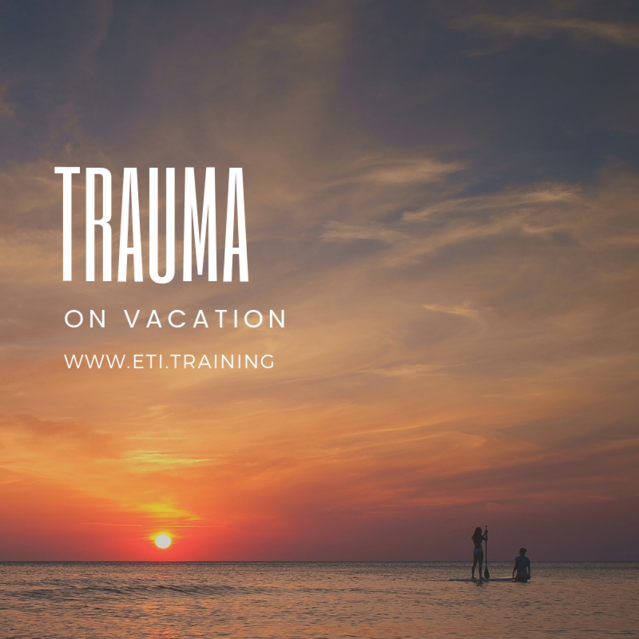Trauma
Trauma on Vacation
What I have learned as a trauma survivor on vacation
Posted August 25, 2019

Growing up with developmental trauma I enjoyed the idea of traveling more than traveling itself. Travel brings transitions, unpredictability, and unknowns, and each of those brings its own additional burden to an emotional system that is for trauma survivors already overloaded. No matter how perfect the vacation - and few come even close - the presence of those three factors together is certain to stir discomfort.
I wrote in an earlier blog about the importance of predictability and consistency for children’s development, and in a different blog about how this lives on in the form of special challenges for adults suffering from developmental trauma. Those blogs aren’t textbook knowledge for me – I write from my own life experience.
In order to sustain progress after trauma, it’s important to get rest and renewal. But getting there is not as simple as it sounds. To rest, the nervous system needs to be calm enough that we can experience and enjoy what’s here and now. Self-regulation is key for that to take place. Even after years of therapy and self-work, it requires ongoing effort to me, like other survivors, to maintain self-regulation.
Less is more
I have learned that it is wise to keep things simple. I am calmer and able to enjoy much more when I do less and not more.
I’ve also learned that I must be careful to design rest and vacations in ways that actually renew me and not according to the stereotypes of a “great vacation”. My need for things to be simple means that most of the wonderful adventures people post glorious pictures about in social media would be far from a good vacation for me.
I work constantly at not comparing myself with others. It’s easy to slip into endless “pursuit of happiness”, a mirage that today's social media reality encourages (read more here). Of course, in reality, no one is having as much fun as it appears in an Instagram, Facebook, Snapchat moment. Surrounding those little moments of big smiles and perfect angles on gorgeous beaches is a big spectrum of emotions that do not come across on social media. Comparing ourselves to the snapshots of best moments of others is a recipe for more pain and needless sadness.
What I do:
I focus on what I know works for me to feel grounded and centered. This changes according to life circumstances so it’s not really a once and done question. But there are some common themes for me.
-The beach is one of the most healing places for me. I make a point of visiting the beach as much as possible, especially on vacations.
-Music, movement, and art always help me feel grounded.
-Spending time with loved ones helps most of the time.
-Rest and giving myself time to be less active help. In these times I limit as much as possible my use of media and work communication.
Triggers on vacation
I wish triggers would take a vacation when I do. Sometimes they actually get worse due to the characteristics of travel I described in the first paragraph above. In these moments the practice of self-compassion is a big help.
Something that took me a while to recognize is that in moments when I am calm or joyful, uncomfortable feelings usually also soon surface. Mostly what I experience is a sadness from losses in the past. When I have free time, time not clearly defined, memories more easily resurface and refuse to go away. In addition, some of the best times in my life were with people now gone, so certain kinds of good times make the pain resurface.
What I do:
In moments when unexpected sadness seems to flood every cell of my body, I use self-compassion breathing as a focus to help me cope. I breathe the sadness in and out, slowly, and remind myself that it is okay to feel sadness, that sadness is a part of life, and I offer compassion and kindness towards myself (read more here).
Learn what kind of vacation is right for you
Over the years I have moved from country to country. While moves like that are stressful, I have learned that I enjoy much more to live in other countries and immerse myself in the local culture, than to travel on short vacations. I have let go of the idea and fantasy of being an adventurer traveler with a pack on my back, on the move without knowing where to land next.
The idea of that sounds great, but in reality, I’ve learned it is not for me. I like seeing other people’s pictures of trips, but you won’t find pictures of me and my family on short voyages around the world!
I’ve written about the difference between stress and eustress, the latter being just enough thrill to stimulate us in exciting ways. I wish I was able to enjoy more eustress. Like many other trauma survivors, if I don’t pay attention eustress can become distressed, and thus a slippery slope towards withdrawal, which for me and many survivors is a default reaction to stress (state 3 in the ETI trauma roadmap read more).
What I do:
I try to plan vacations that require fewer transitions, unknowns, and stress. I plan to stay in one location for several days. Or I take day trips without staying over elsewhere. I plan ahead of time to have rest days. For returning, I plan to have time for getting settled and re-engaging routines back at home.
Work on Vacation
For better or for worse, I think about my work and my clients and, even on vacation.
While disconnecting and giving myself space is important for sustainability, so is a connection to meaning and purpose. I love what I do and it does indeed give me a connection to deep things I care about. So it’s natural that I think about work and sometimes engages in it on vacation. That includes writing this post!
When I am on vacation, when I have more time to pause and ponder, I often get new clarity about my clients and what we may want to do next. While I remain on call for my clients while away, there is generally much less contact than when I am at home. This introduces new dynamics in the therapeutic relationship that can provide a valuable opportunity for mis-attunement and re-attunement. Why valuable?
Learning to give space for re-attunement with another person is one of the most important goals of trauma therapy. The client slowly learns that I genuinely care, that it is safe enough to open up and trust me, that I will be there. However, the client learns that I will not always be there perfectly, that I will mis-attune. The change in setting is one of these experiences that provide an opportunity to learn together how to tolerate these uncomfortable feelings and sensations, and to learn how it feels to re-attune.
What I do:
I recognize that as a therapist, the nature of my work requires me to take longer periods of time than most people during which I rest. Like many other therapists, I am a trauma survivor, which adds even more to my requirements to rest from work.
There are no universal recipes for perfect rest and renewal that works for all. We each need to find the way for us. Moreover, the things that work and don’t work change and evolve for each of us, and vary with circumstances. You don’t need to go away on an exotic escapade to take a vacation. You might have a better time staying home. For trauma survivors, give priority in designing vacations to things that facilitate rest, renewal and sustainability.
People with sensitive nervous systems like me need to maintain ongoing daily and weekly routines throughout the year to sustain ourselves. In addition, some kind of vacation that goes beyond the small breaks can be great. However, it is important to stay away from vacations that are so stressful that in the end, we need to recover from the vacation.




